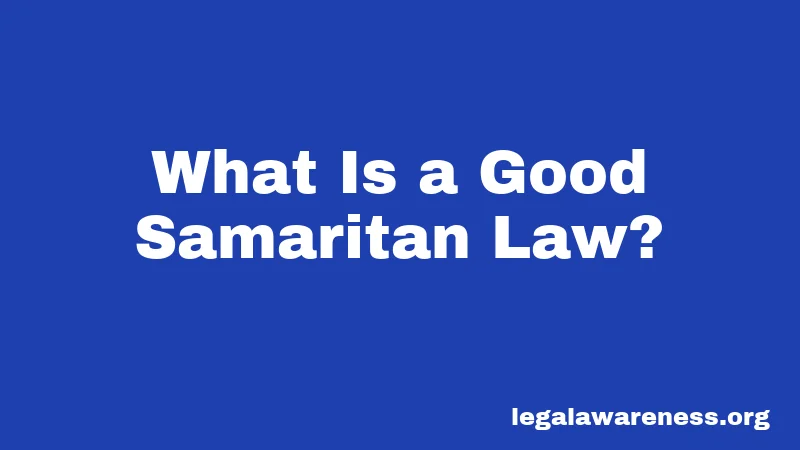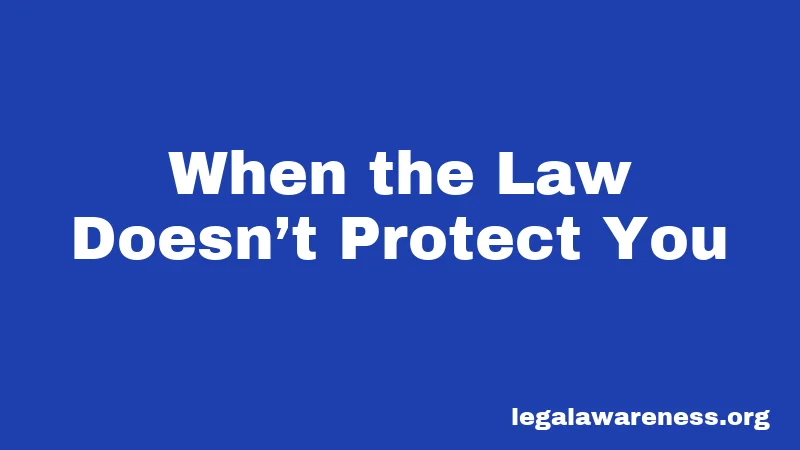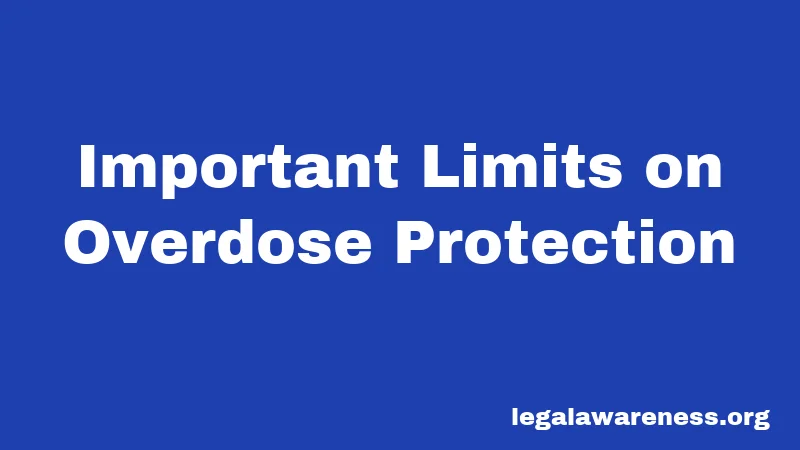California Good Samaritan Laws (2026): Your Legal Protection When Helping
Most people have no idea this is even a thing. Seriously. But in California, when you step in to help someone in an emergency, the law actually has your back. The state has Good Samaritan laws that protect you from getting sued if something goes wrong while you’re trying to save a life. That’s right—California wants you to help without fear.
Here’s the thing: emergencies happen fast. Someone’s choking. A car accident just occurred. A person’s having a heart attack. In moments like these, most people hesitate. They think, “What if I make it worse? What if I get sued?” California’s Good Samaritan laws say you don’t have to be paralyzed by that fear.
What Is a Good Samaritan Law?

A Good Samaritan law is pretty straightforward. It protects people like you who step in to help others during emergencies. The law basically says this: if you’re trying to save someone’s life and something unintended happens, you won’t be held legally responsible.
Think of it like permission to act. The law tells you it’s okay to try. That’s the whole point.
California enacted its main Good Samaritan law way back in 2007. Then in 2009, lawmakers expanded it with something called Assembly Bill 83. This change was important because it meant protection didn’t just cover medical emergencies anymore. Now it covers non-medical emergencies too. You could help calm someone down during a mental health crisis or help deliver a baby. The law protects you either way.
Basic California Good Samaritan Protections
What the Law Actually Protects You From
Here’s what you really need to know: you’re protected from civil liability. That means someone can’t successfully sue you for damages while you’re helping in an emergency. This is huge. Without this law, people might avoid helping others just to stay out of court.
The protection covers emergency medical care. Basically, if you’re trained in first aid or CPR, you can do it. You won’t get sued if you break someone’s ribs doing chest compressions. Yes, that happens sometimes. But the law says that’s okay if you’re acting in good faith.
But wait—it gets more interesting. The law also covers non-medical help. You could help someone who’s having a panic attack. You could pull someone from a burning building. You could perform the Heimlich maneuver on a choking person. All protected.
The Key Requirements You Need to Know
Not every good deed is automatically protected. You have to meet certain conditions. Stay with me here, because this part matters.
First, you must act in good faith. That means you genuinely intended to help. You weren’t trying to cause harm or get revenge on someone. Pretty simple concept, right?
Second, you can’t expect compensation. That’s the whole idea. If someone offers to pay you and you accept, the law doesn’t protect you. You’re helping as a volunteer, with no payment expected upfront.
Third, the emergency has to be happening right now. Not in a hospital or clinic where doctors are already there. Not in an emergency room. The law specifically says emergencies at the scene count. Once professional medical care is available, the protection changes.
Finally—and this is important—you can’t be grossly negligent or act with willful misconduct. We’ll break down what that means in the next section.
When the Law Doesn’t Protect You

Okay, pause. Read this carefully. The law has limits. Knowing these limits could save you from problems later.
The biggest exception is gross negligence. This sounds complicated, but it’s not. Gross negligence means you acted with extreme carelessness. You showed a shocking lack of care. If a reasonable person would have acted completely differently in that situation, that’s gross negligence.
Example time. You’re at a restaurant and someone’s choking. You perform the Heimlich maneuver, but you do it so recklessly that you break multiple ribs and puncture a lung. That could be gross negligence depending on how badly you messed up. But a broken rib from proper CPR? That’s protected.
Willful or wanton misconduct is different. This means you acted with reckless disregard for safety. You knew what you were doing was dangerous and you didn’t care. Maybe you administer medication you know nothing about, making things worse. That’s not protected.
Here’s where it gets important: the law doesn’t protect you from all criminal charges. If you’re helping someone and you commit an actual crime, the law won’t shield you. Example? You’re helping someone in a car accident, but you’re texting and driving. You cause another accident while trying to help. You could still face a DUI charge if you were under the influence.
The law also doesn’t apply to medical professionals in their regular jobs. If you’re an EMT and you’re on duty, this law doesn’t protect you. Why? Because it’s literally your job to help. Different rules apply to professionals.
California’s Drug Overdose Good Samaritan Law
Here’s where it gets really important. California has a special Good Samaritan law just for drug overdoses. This one is a lifesaver—literally.
The law is called AB 472, and it was passed in 2013. It addresses something real: people die from overdoses every day because witnesses don’t call 911. Why? They’re afraid of arrest. They’re afraid they’ll get in trouble for having drugs on them. AB 472 changes that.
Wondering if this applies to you? Let me break it down. If you call 911 for someone having a drug overdose, you get protection from arrest and prosecution. This covers low-level drug violations only. You can possess a small amount of drugs for personal use and still be protected. Drug paraphernalia is covered too.
This protection applies to two groups. First, the person experiencing the overdose. If someone’s overdosing and they need help, calling 911 protects them from low-level drug charges. Second, anyone else at the scene can call for help without fear of prosecution for drug possession.
Here’s what makes it work: you have to call in good faith. That means you genuinely believed someone needed emergency medical help. You need to stay at the scene until help arrives. You can’t obstruct medical or law enforcement personnel. Pretty reasonable, right?
The law also covers people administering naloxone—the overdose reversal drug. If you use naloxone to save someone’s life, you won’t be prosecuted. Even if you’re under the influence yourself or have drugs on you, the protection holds as long as you called for help.
Important Limits on Overdose Protection

Okay, this is where people often get confused. The drug overdose law doesn’t protect everything.
It doesn’t protect drug trafficking or sales. If you’re caught with enough drugs to suggest you’re selling, that protection evaporates. The law specifically says it doesn’t affect laws against selling, providing, or exchanging drugs.
It doesn’t cover violations of parole or probation. If you’re already on parole or probation, calling 911 won’t automatically protect you from violations of those terms. You might still face trouble.
It doesn’t protect you from obstructing law enforcement. If police arrive and you prevent them from doing their job, you can face charges.
It doesn’t cover other crimes. You’re texting and driving? That’s still illegal. You’re driving under the influence while heading to help someone? That DUI charge still stands.
Practical Examples That Really Happen
I looked this up recently. The situations people face are real and sometimes messy. Understanding how the law applies helps you know what to do.
Someone’s having a heart attack at your workplace. You know CPR. You perform it even though you’re not medical trained. Someone’s ribs break. Normally, they could sue you. Under California’s Good Samaritan law, they can’t. You acted in good faith trying to save their life.
A friend overdoses at a party. You’re all using drugs. You’re scared to call 911 because you have drugs on you. AB 472 says call anyway. You won’t face arrest for the drug possession. That person’s life matters more than low-level charges.
You’re driving and see a car accident. You stop to help. You accidentally move the injured person wrong and they suffer more damage. Normally, this could be a lawsuit. But you acted in good faith in an emergency. The law protects you.
A woman goes into labor on the street with no hospital nearby. You help deliver the baby. Something goes wrong. The Good Samaritan law protects you because you were doing emergency non-medical care in good faith.
How to Make Sure You’re Protected
Your actions matter when you’re protecting yourself legally. Let me walk you through what makes the difference.
First, make sure there’s actually an emergency. The law doesn’t apply to non-emergencies. If someone’s already getting professional medical care, you’re in a different situation.
Second, act within your abilities and training. If you’re trained in CPR, use CPR. If you’re not trained in medication, don’t administer it. Stay in your lane. This is what “good faith” really means—reasonable care based on what you know.
Third, don’t accept payment. Seriously. Don’t let someone hand you money for helping. The moment you accept compensation, the law protection might disappear.
Fourth, don’t abandon the person. If you start helping, stay until professionals arrive. Walking away might suggest you weren’t acting in good faith.
Fifth, in overdose situations, call 911. Actually call it. Use the phone. Communication made verbally or even through a smartwatch counts. Seeking medical assistance is the key action that triggers the protection.
When to Seek Help From a Lawyer
Not sure what counts as gross negligence in your situation? Talk to a lawyer. Honestly, if you’ve helped someone and now facing a lawsuit, get legal advice immediately. Don’t wait.
You’ve been arrested despite calling 911 for an overdose? You need a lawyer urgently. A good attorney can argue that AB 472 protections applied to your situation.
You’re facing a lawsuit even though you acted in good faith during an emergency? A lawyer can help you get the case dismissed based on Good Samaritan protections.
The key is acting fast. If you’ve helped someone and they’re now claiming injury, legal action happens quickly. Don’t delay getting advice.
Frequently Asked Questions
Can I get sued even with the Good Samaritan law? Yes, technically someone can sue you. But if you meet the requirements—acting in good faith, not expecting payment, at the scene of an emergency—you should be protected from successful lawsuits. You’d likely win the case early on.
Does the law protect me if I’m a medical student or nurse? It depends. If you’re trained medical personnel on duty at a hospital, no. If you’re off-duty and helping in a true emergency outside your workplace, probably yes. The law gets stricter for people who have professional duties.
What if I’m the one who caused the accident? This gets tricky. If you caused the accident, you might have a duty to help. Your situation changes. You might not qualify for Good Samaritan protection because you’re partly responsible. Talk to a lawyer if you’re in this situation.
Can I administer naloxone to save someone from an overdose? Absolutely. California law actually encourages it. You’re fully protected when using naloxone if you’re trying to save someone’s life from an overdose. Even if you’re under the influence, the protection holds.
What happens if I help someone and they never get hurt? Nothing happens. The Good Samaritan law only matters if something goes wrong and they want to sue. If you help and everything’s fine, there’s nothing to worry about.
Final Thoughts
California’s Good Samaritan laws are actually pretty generous. They encourage people to help without fear. That’s the whole point—to build a community where people feel comfortable stepping in during emergencies.
The most important thing to remember is this: act in good faith. Use your best judgment. Stay within your abilities. Don’t expect payment. Follow these basics and you’re protected.
If you’re ever unsure, call 911 and let professionals take over. No shame in that. But if you do step in to help, California’s laws have your back.
Now you know the basics. Stay informed, stay safe, and when in doubt, look it up or ask a lawyer. You might just save someone’s life, and the law says that’s a good thing.
References
Official California Statutes
- California Health and Safety Code Section 1799.102 – Good Samaritan Law — https://codes.findlaw.com/ca/health-and-safety-code/hsc-sect-1799-102/
- California Health and Safety Code Section 11376.5 – Drug Overdose Good Samaritan Law — https://codes.findlaw.com/ca/health-and-safety-code/hsc-sect-11376-5.html
Government and Official Resources
- California Legislative Information – Assembly Bill 83 (2009) — https://leginfo.legislature.ca.gov/faces/codes_displaySection.xhtml?sectionNum=1799.102.&lawCode=HSC
- California Legislative Information – Assembly Bill 472 (2013) — https://leginfo.legislature.ca.gov/faces/billNavClient.xhtml?bill_id=201120120AB472
Educational and Legal Resources
- Understanding California’s Good Samaritan Law – Eric Ratinoff Law Corp. — https://www.ericratinoff.com/understanding-californias-good-samaritan-law/
- California’s Good Samaritan Drug Overdose Law – Wallin & Klarich — https://www.wklaw.com/california-good-samaritan-drug-overdose-law/
- Riverside University Health System – AB 472 Overview — https://www.ruhealth.org/public-health/roda/good-samaritan-law
This article is for informational purposes only and is not legal advice. Laws change, and situations vary. Always consult with a California attorney for specific legal questions about your situation.
